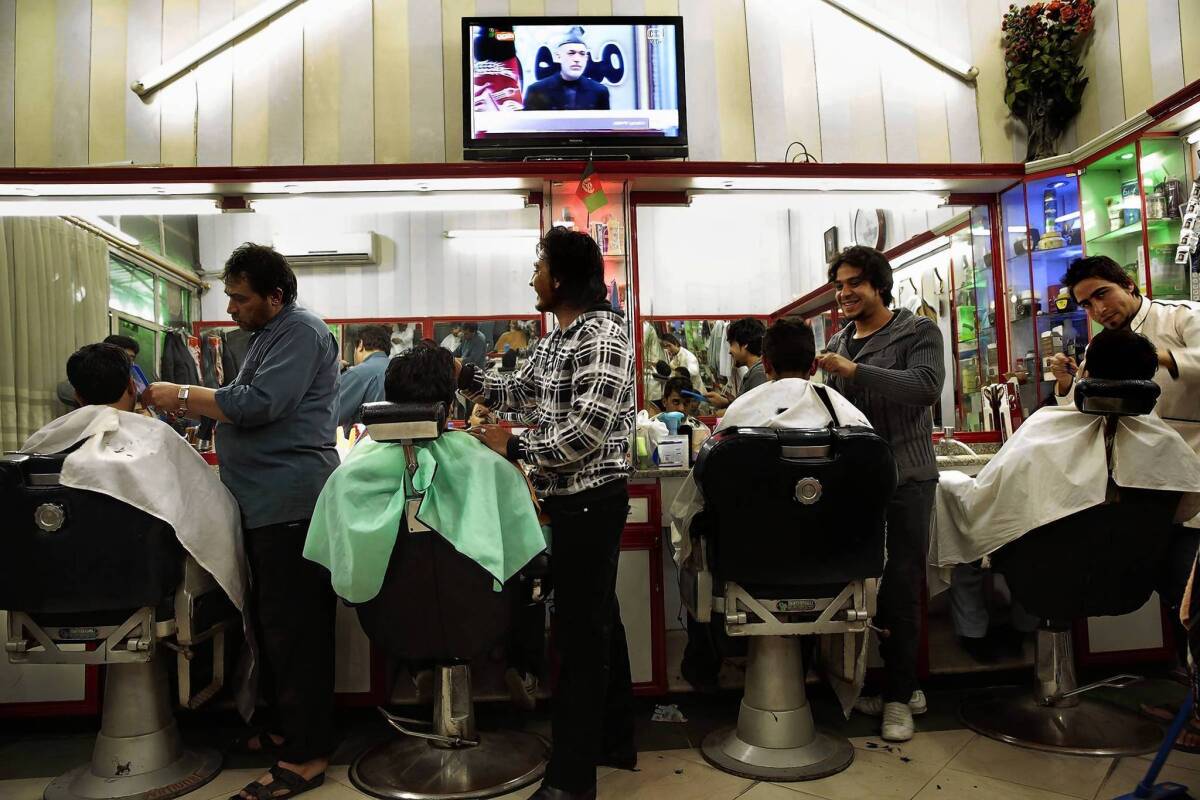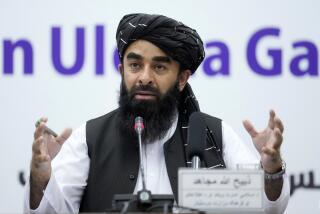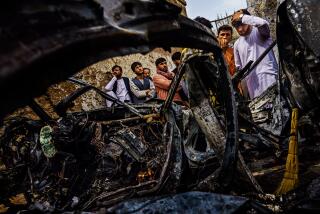Karzai lobs new curveball on U.S.-Afghan security agreement

KABUL, Afghanistan — He expressed outrage, sarcasm and black humor. He cast himself as a lonely voice defending his country’s pride and sovereignty against American arrogance.
After a frantic week of last-minute negotiations, Afghan President Hamid Karzai delivered a tepid endorsement Thursday of a proposed 10-year security pact with the United States in a rambling speech to an Afghan tribal gathering. But he then surprised attendees — and the world — by saying Afghanistan might not sign the accord until next spring.
Karzai told the 2,700 Afghan delegates to the assembly, known as a loya jirga, that the agreement was vital to Afghanistan’s future security. But he complained bitterly about his dysfunctional relationship with the United States and suggested that his successor be the one to sign the deal after elections in April.
It was a typically mercurial twist by a leader known for maximizing his leverage and keeping himself at the center of events. U.S. officials, who had announced agreement on a draft text just hours before Karzai’s speech, must now gauge whether he was grandstanding or angling for more concessions.
The U.S. expected a much quicker resolution. Secretary of State John F. Kerry announced Wednesday that the nations had agreed to the text of the pact. A letter from President Obama delivered to Karzai just before the speech told the Afghan president he sought to have the pact concluded promptly.
Karzai’s performance also bewildered Afghans, who have been waiting for months, debating whether to flee with their life savings or to stay once the assurance of another decade of American military and financial support was guaranteed. U.S. aid spurs jobs, commerce, investment and, most important, confidence in Afghanistan’s capacity as a functioning state.
Afghan military commanders, who can’t keep their U.S.-supplied Humvees running even with U.S. trainers at their elbow, acknowledge that their security forces cannot hold off an entrenched insurgency without American trainers and cash for paychecks, weapons and supplies.
Karzai’s move forced them all to pause, if not recalculate.
“My trust with America is not good. I don’t trust them and they don’t trust me,” Karzai told the delegates, most of them white-bearded elders in ornate turbans, at the close of his 75-minute address.
“I have fought with them the last 10 years, and they have made propaganda against me,” an apparent reference to depictions of Karzai by some American officials as corrupt, cunning and unreliable.
Karzai’s comments set off a blast of Twitter posts by Afghans even before he had finished speaking. The address was broadcast live, with people gathered around television sets at home and in barber shops during a six-day loya jirga holiday declared by Karzai.
Karzai did not seem inclined to temper his criticism, even with U.S. Ambassador James B. Cunningham and Marine Gen. Joseph F. Dunford Jr., the top commander here, in the audience.
The agreement would create a much smaller U.S. force, primarily for training and counter-terrorism, after combat troops withdraw by the end of 2014. But it commits the United States to another decade of expensive support after the longest war in U.S. history, a brutal 12-year campaign that has cost more than 2,200 American lives, countless wounded and psychologically damaged veterans, and $96.5 billion in reconstruction aid.
Karzai’s move creates logistical challenges for the Pentagon, which is desperate to begin planning for future deployments while closing bases and shipping home vehicles, gear and equipment as combat troops leave. Like many Afghans, U.S. commanders have been largely stuck in neutral while awaiting confirmation that the U.S. military commitment will indeed continue into 2015.
The loya jirga is stacked with delegates appointed by or loyal to Karzai. Some Afghan politicians and analysts say Karzai is using the gathering for political cover. A final deal must also be approved by Afghanistan’s parliament, which is viewed as likely to endorse it.
U.S. officials have asked Karzai’s office for clarification of his remarks because it was unclear whether the possible delay referred to signing the agreement before it is sent to the parliament, or a final presidential signature that enters the agreement into law.
Despite Karzai’s brinkmanship during negotiations, the deal he presented to the loya jirga did not contain all concessions he had sought. And even with a long delay, Karzai is taking a political risk. He is reviled by the Taliban as an American and CIA “stooge.” Many Afghans believe he is too close to the United States and too eager to accept U.S. cash and troops.
As Karzai read aloud Obama’s praise for the sacrifices of U.S. troops, a female senator shouted him down. She screamed that Karzai cared more about American lives than the thousands of Afghan civilians killed in the last 12 years. According to the United Nations, a sizable majority of civilian deaths have been inflicted by insurgents.
According to the agreement, U.S. troops accused of crimes in Afghanistan would be subject to U.S. rather than Afghan law, despite Karzai’s insistence on legal jurisdiction. And U.S. special operations forces would continue to conduct counter-terrorism operations in Afghan villages, with more constraints now that Afghan forces are leading combat operations. Karzai had initially demanded an end to the so-called night raids.
In his letter, Obama wrote that U.S. forces would “not enter Afghan homes for the purposes of military operations, except under extraordinary circumstances involving urgent risk to life and limb of U.S. nationals.”
Karzai had also pushed hard for a defense treaty obliging the U.S. to defend Afghanistan militarily against “external aggression,” specifically from Pakistan, an erstwhile U.S. ally. The U.S. resisted. Instead, the agreement says the U.S. will view external aggression with “grave concern” and “consult urgently” with Afghanistan.
At times in recent days, some U.S. officials were worried that the negotiations could collapse. But after two days of phone calls, Karzai received the last-minute letter from Obama with assurances he had demanded.
“That seemed to be enough,” said one U.S. official who requested anonymity to discuss the sensitive talks. Karzai’s speech Thursday “posed a whole new set of complications,” although the official added that the U.S. remained hopeful the loya jirga would approve the pact.
Karzai accused the U.S. of pressuring him to sign the deal too quickly. He insisted on taking time to study proposed language “line by line and word for word” while seeking consultation with Afghan elders.
He said Kerry rebuffed him Tuesday when he suggested putting off the pact until a new Afghan president is elected.
In a remark certain to antagonize U.S. commanders, Karzai told the loya jirga: “I ask them to give me fighter jets but they give me helicopters. I ask them to give me tanks but they give me pickup trucks. I don’t want them. I can get them from Japan.”
At one point, Karzai drew ripples of laughter when he demanded that the U.S. treat Afghanistan with dignity and respect as an honest partner — “and bring a lot of money.”
Special correspondent Hashmat Baktash in Kabul and Times staff writer Shashank Bengali in Washington contributed to this report.
More to Read
Start your day right
Sign up for Essential California for news, features and recommendations from the L.A. Times and beyond in your inbox six days a week.
You may occasionally receive promotional content from the Los Angeles Times.







